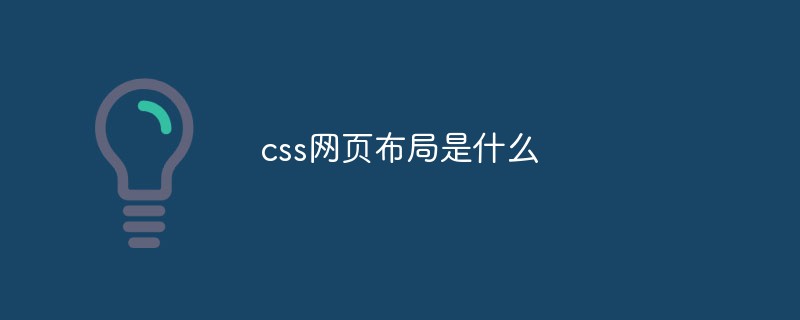
The essence of a web page is the position between blocks. Blocks are next to blocks, blocks are nested within blocks, and blocks are stacked on top of blocks. CSS web page layout refers to using CSS to plan the layout of web page content, summarizing and distinguishing primary and secondary content; following certain principles, placing pictures, text and other content into different positions on the page in the most suitable way for browsing Give users a good browsing and reading experience.

The operating environment of this tutorial: Windows 7 system, CSS3&&HTML5 version, Dell G3 computer.
The essence of a web page is the position between blocks. Blocks are next to blocks, blocks are nested within blocks, and blocks are stacked on top of blocks.
Web page layout design is an important factor affecting the aesthetics of web interface design. A reasonable and beautiful layout can not only leave a deep impression on the user group, but also be a factor in increasing website views.
css web page layout refers to using css to plan the layout of web page content, summarizing and distinguishing primary and secondary content; placing pictures, text and other content in a way that is most suitable for browsing, following certain principles, and placing The different bit sizes on the page give users a good browsing and reading experience.
Web page layout is an important part of web page optimization, and to a certain extent, the overall beauty of the website.
Page layout principles
Understanding the layout principles of web pages will help to design beautiful and orderly pages. In web design, the layout principles mainly include three aspects: integrity, contrast and balance. The specific introduction is as follows
1. Holistic
Holisticity refers to the wholeness and unity of design elements. An overall unified layout means that different elements on the page interact with each other as a whole, and all buttons and other control elements on the page should be consistent. The shapes, sizes, and colors that appear repeatedly on the web page are an organically linked whole. Organize page elements into blocks to make the page more integrated and help unify the layout style.
2. Contrast
Web pages are composed of many elements, and the importance of these elements varies. Some content elements need to be highlighted. At this time, contrast is needed to create visual interest and guide the user's attention. Comparison includes color contrast, font size comparison, block area size comparison, etc.
3. Balance
The balance in a web page refers to the visual balance of text, shape, color and other factors on the page. Visual balance is divided into symmetrical balance and asymmetrical balance. Each element in a web page has weight. If it reaches a symmetrical balance, the page will appear quiet and steady. To add interest to your page, choose asymmetrical balance.
Related recommendations:
What layout methods are there in css
How to implement waterfall flow layout in css
How to implement responsive layout in css
16 CSS pseudo-classes that you may not know about to improve layout efficiency! !
For more programming-related knowledge, please visit: Introduction to Programming! !
The above is the detailed content of What is css web layout. For more information, please follow other related articles on the PHP Chinese website!